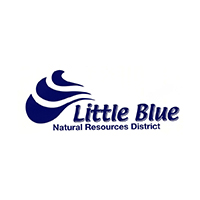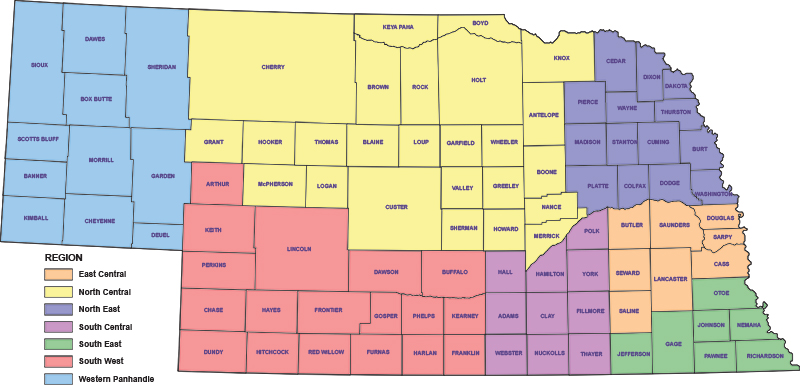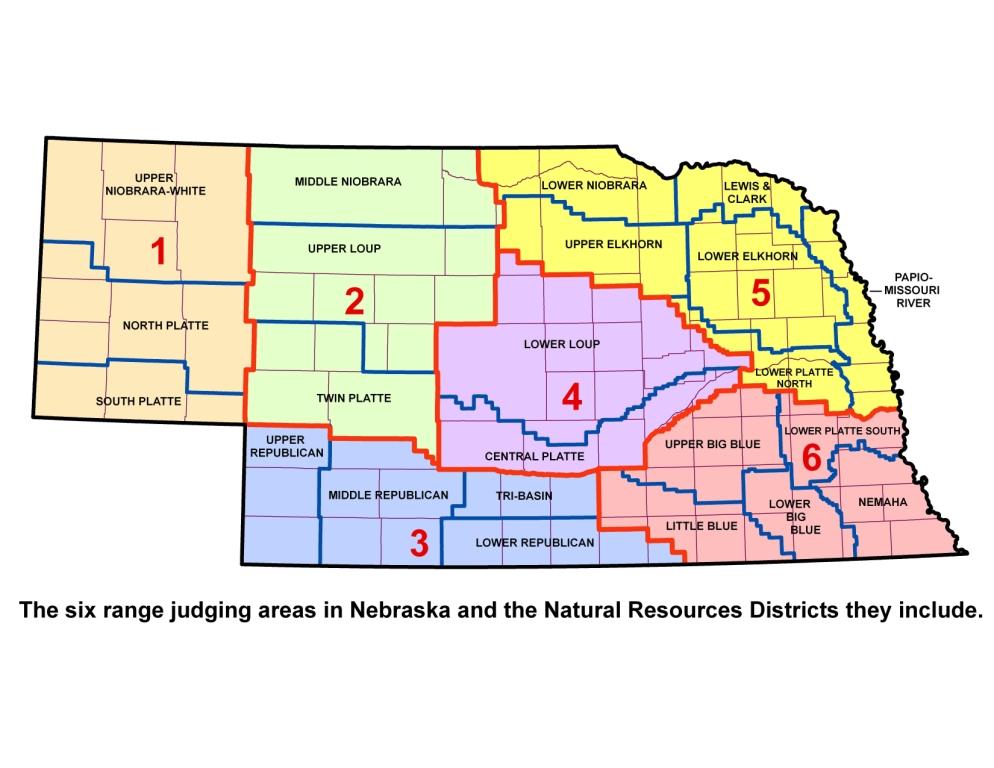Education
A core value of ours, we pride ourselves on staying involved in the community by educating our children on the importance of conservation and treating our land right.
Through scholarships, we provide opportunities for students, teachers and our youth to learn more about helping the environment.
High School / College Scholarships
The Little Blue Natural Resources District will offer three $500 scholarships to qualified students that reside within the Little Blue Natural Resources District. The student must be attending a two-year or four-year college, majoring in a conservation or environmental field, academically in good standing and live in the district.
The following is a list of acceptable conservation and environmental majors. Other majors related to conservation or an environmental field of study may also be considered. ( “»” denotes priority majors):
- Agribusiness Diversified Agriculture
- Agricultural Education Entomology
- Agricultural Engineering Horticulture
- Agronomy Horticulture & Forestry
- Animal Science Insect Management
- Crop Protection Integrated Pest Management
- » Environmental Studies
- » Range Science
- » Fisheries & Wildlife
- » Soil Science
- » Forestry, Fisheries & Wildlife
- » Water Science
- » Natural Resources Management
- » Pre-Forestry
- » Water Resources Planning & Management
Youth Scholarships
- Students that plan to attend Adventure Camp about the Environmental during the summer may apply for a grant. Other workshops may be considered pending review by the NRD staff. The amount of a grant will vary and will be distributed throughout a seven-county area.
- Application forms are sent to all county extension offices and made available to students.
Teacher Workshop Scholarships
- Teachers that hold a position within the boundaries of the Little Blue NRD may apply for grant funds toward an environmental workshop. The grant amount is $25.
- Teachers interested in the funding can write a letter briefly describing the workshop and mail it to the NRD for consideration. Teachers who receive a grant are asked to send a copy of the total receipt of the workshop to the NRD.
- The NRD also offers environmental education resource materials, activities and special events throughout the seven-county District. If you have an idea, never say never, just ask.
Earth & Water Jamboree
- The Jamborees are offered to schools free of charge and provide teachers with a pre-test and detailed information they can utilize in their curriculum. The Jamborees are provided by the Little Blue NRD and several other sponsors and are held on an annual rotational basis in the fall of the year.
- The Water Jamboree is held at Liberty Cove Recreation Area southwest of Lawrence, NE. Liberty Cove is owned and operated by the Little Blue NRD. Some sessions of the Water Jamboree include: Life in Lake Liberty, Wetland Wonders, Going with the Irrigation Flow, and Life outside Lake Liberty.
- The Earth Jamboree is held at Clay County Fairgrounds in Clay Center, NE. Some sessions of the Earth Jamboree include: Science on the Farm, Environmental Jeopardy, Treasure Hunt, and Wild World of Pest Management.
To sign up please fill out the form below:
Sorry. This form is no longer available.
Earth Festival
The Earth Festival is designed to educate 5th & 6th grade students through new and exciting aspects of water and earth stewardship by utilizing hands-on sessions.
The program is provided by the Little Blue NRD along with several other agencies and is
Land & Range Judging
The Little Blue NRD assists in sponsoring the Land and Range Judging competitions. The events give high school FFA students the opportunity to compete against area schools in various aspects of each particular competition. Winners in each contest advance to compete at the state level.
Land Judging is a high school competition that challenges students to gain a better understanding of soil structure and land evaluation. Land Judging enables each participant to learn how to recognize the physical features of the soil, determine land capability for crop production, and evaluate management practices needed for proper stewardship. Soil, land and home-site evaluation provide a setting for students to investigate the soils in their region, the environment that surrounds them and their effect on their daily lives.
Soil is one of the most important natural resources of our environment. Soil supports and influences the crops we grow for food and fiber, the water we drink, and the air we breathe. The soils of the world fit for plant growth must sustain all the plants, animals and humans that make the Earth their home. The soil acts as a filter for the water entering the groundwater supply, as well as interacting with or being eroded by the water that flows over the surface. Soil has a direct effect on the air we breathe when it becomes airborne and is evident when dust settles or obscures vision. Soil takes long periods of time to develop but can be destroyed or eroded away in very short periods. It is only through proper stewardship of soil that life on Earth can be sustained and improved.
In the Land Judging Contest, the top three teams from each region advance to the State Competition. You can view the regions below. Only one team from each school can compete at the state contest, even if they rank higher in the contest. The event is sponsored by the Little Blue NRD, NRCS and County Extension.
The Nebraska Section, Society for Range Management has the following established goals:
- to properly take care of the basic rangeland resources of soil, plants, and water;
- to develop an understanding of range ecosystems and principles applicable to the management of range resources;
- to assist all who work with range resources to keep abreast of new findings and techniques in the science and art of range management;
- to improve the effectiveness of range management, to obtain from range resources the products and values necessary for man’s welfare;
- to create a public appreciation of the economic and social benefits to be obtained from the range environment, and;
- to promote the professional development of its members.
Envirothon
The Envirothon is a program for high school freshman to seniors. This program provides an opportunity to learn more about our natural environment and put aquired skills to the test.
- The contest tests the students’ knowledge on subjects such as soils, aquatics, forestry, wildlife, range, current environmental issues and one area of national interest. The Envirothon began in Pennsylvania in the spring of 1979. High school teachers and youth leaders recognized the value of the Envirothon as a means of strengthening the environmental awareness of young people, and the program spread to many other states and countries. Nebraska held its first Envirothon in 1992.
- The Envirothon experience is a unique approach to environmental education. Five-member teams compete in a setting where they learn that cooperation is needed to achieve success. Participation in this unique event can be great fun for both students and their advisors. The activities are designed to help the students become environmentally aware, action-oriented adults.
- Each year several Regional Envirothon contests are held across Nebraska. The winning five-member team from each regional competition is invited to represent their region at the Nebraska State Envirothon Competition. An additional 8 wildcard teams are also invited. The state champion goes on to represent Nebraska at the Canon Envirothon.
- The Nebraska Envirothon is guided by a steering committee made up of representatives from agencies involved in natural resources.
Outdoor Classroom
Bring our natural world to life for students of any age with an outdoor classroom. Schoolyard classrooms serve as a “down to earth” way to learn about our natural surroundings. They develop sanctuaries for birds, butterflies, insects, reptiles, small mammals and other wildlife.
- The Little Blue NRD offers schools, FFA and 4-H groups the opportunity to develop an outdoor classroom with a $200 grant made available for materials.
- The District may also make available free seedlings from Halsey forest, grass drill, grass seed, and other materials.
- All it takes is to contact the NRD, fill out an application, set up a site visit, a quick class visit, and finally a layout and design evaluation.
- Things to remember when designing an outdoor classroom:
- Use an area that naturally fits the space available near your school
- The best choice for the local climate is Native Nebraska plants.
- Go Beyond Biology: Outdoor areas are excellent for hands-on teaching of natural sciences.
- The best curriculum ideas don’t stop there. Math teachers can use habitat areas to teach basic geometric shapes to 1st graders, for example.
- Plants are beautiful, but your gardens will be far more interesting if you attract birds, small and large mammals, reptiles and other wildlife


